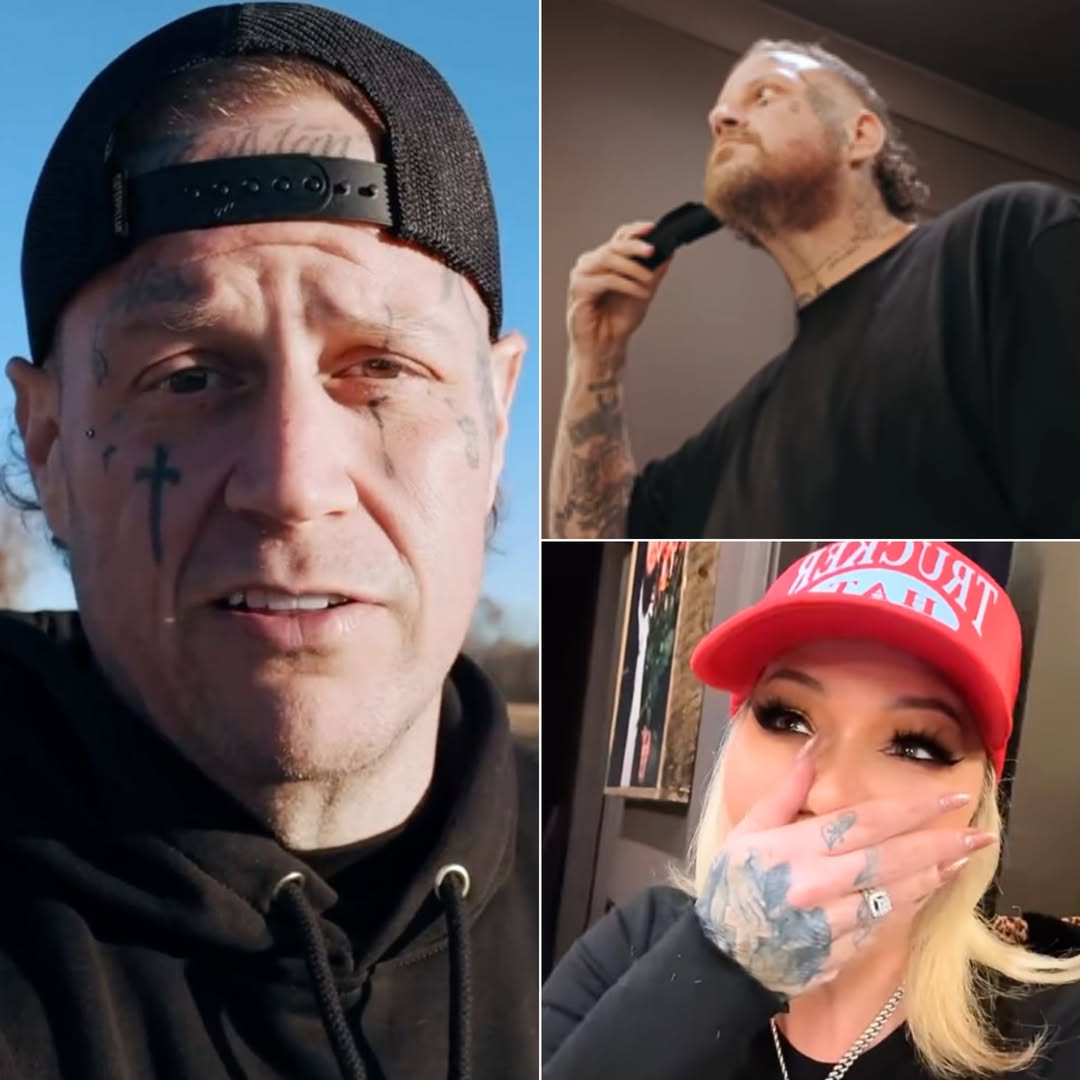Jelly Roll’s astonishing 200-pound weight loss had already left fans doing double-takes, squinting at photographs and videos as if their eyes were betraying them. For years, they had come to know a man whose face, often obscured by a thick beard, carried the weight of struggle, exhaustion, and a history few fully understood. But nothing—not a single headline, interview, or clip—could have prepared them for the moment he stepped out from behind the bathroom mirror, his face fully exposed, revealing features that hadn’t been seen in over a decade. The air in the room shifted. Bunnie XO’s laughter, which had been bright and carefree moments earlier, dissolved into stunned silence. Bailey’s hand flew to her mouth, her eyes wide as if trying to process a private revelation unfolding before the entire group. Friends, roommates, collaborators, and fans witnessing the moment remotely all seemed to inhale in unison, the collective pause speaking to the power of vulnerability finally laid bare. And in that pregnant silence, one heartbreaking truth quietly surfaced: the man they were now seeing had spent years hiding behind more than just facial hair—he had hidden behind a shield built from pain, shame, and the burdens of obesity.
When Jelly Roll finally picked up the clippers and began scraping away the beard that had cloaked him for so long, it wasn’t merely hair falling into the sink—it was the final, visible layer of a persona carefully constructed to protect him from the judgment of the world, and from himself. The beard had been a fortress, a buffer against the daily humiliation of a body that had carried more than it ever should have, and a reminder of the countless nights he felt trapped in a skin that didn’t feel like his own. As the clippers hummed, each buzz punctuated the quiet in the bathroom, it felt almost ritualistic—a countdown marking the shedding of more than just hair. With every pass, the reflection in the mirror evolved, the face looking back at him becoming less a relic of survival and more a portrait of triumph, resilience, and the man he had fought to become. Lines of stress, sleepless nights, and struggle seemed to soften; eyes that had often looked weary and guarded now shone with a kind of quiet pride.
The reactions of those around him captured the essence of what fans and followers had felt throughout his journey. Bunnie’s initial shock, caught somewhere between awe and disbelief, reflected the incredulity many shared when witnessing the culmination of years of determination. Bailey’s tears were unrestrained, her quiet sniffles and shaky exhale punctuating the room’s atmosphere with the recognition that this transformation was about far more than appearance—it was a rebirth. Friends’ exclamations, a mixture of joy, surprise, and unfiltered astonishment, mirrored the audience at home who had followed Jelly Roll through every high and low, every gym session, every confession about food, mental health, and self-worth. This moment was not a simple cosmetic change or a fleeting social media spectacle—it was the physical manifestation of a deeply personal journey, a testament to the sheer perseverance required to reclaim not only a body but a sense of self long buried beneath layers of fear and avoidance.
Days later, when Jelly Roll joked about looking like a “ninja turtle” during a candid conversation with friends, it was a moment of levity layered over profound vulnerability. There was humor, certainly, but there was also an unspoken acknowledgment of the stark contrast between past and present. The man who had once relied on a beard to obscure a face he felt ashamed of now addressed Grammy nominations with calm confidence, owning every inch of his presence in the spotlight. It wasn’t about vanity, a perfectly sculpted jawline, or fitting into societal ideals of attractiveness. It was about claiming visibility after years of hiding, about stepping into the world without barriers, and about finally confronting the truth that he was enough without any mask.
The clean-shaven reveal was, in essence, symbolic: it told a story of resilience, survival, and reinvention. It showcased a man who had faced the darkest aspects of his life—physical pain, mental struggles, and societal judgment—and emerged not just lighter in weight, but freer in spirit. Fans who had followed his journey, from the beginning of his public transformation to this intimate, raw unveiling, understood that this was a milestone not measured merely in pounds lost but in courage gained. The transformation carried a universal message: that the truest victories are those over oneself, and that the act of being fully seen—unprotected, unmasked, and unapologetically authentic—is in itself a triumph worthy of celebration.
By standing barefaced before the world, Jelly Roll communicated what words alone could not. He showed that the man who once hid from his reflection, who once feared confrontation with his own image, who once relied on every shield at his disposal, could now face the world openly, wholly, and unreservedly. And in that act, he not only redefined himself for fans and friends but, perhaps more importantly, for the person he had always been inside—a resilient, determined, and unapologetically authentic individual finally ready to be fully seen and fully embraced.
